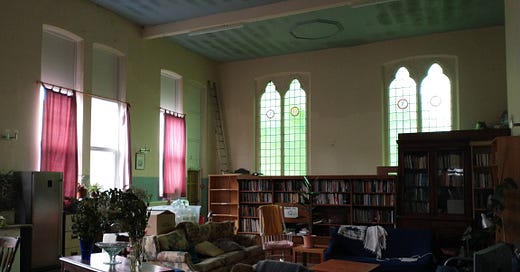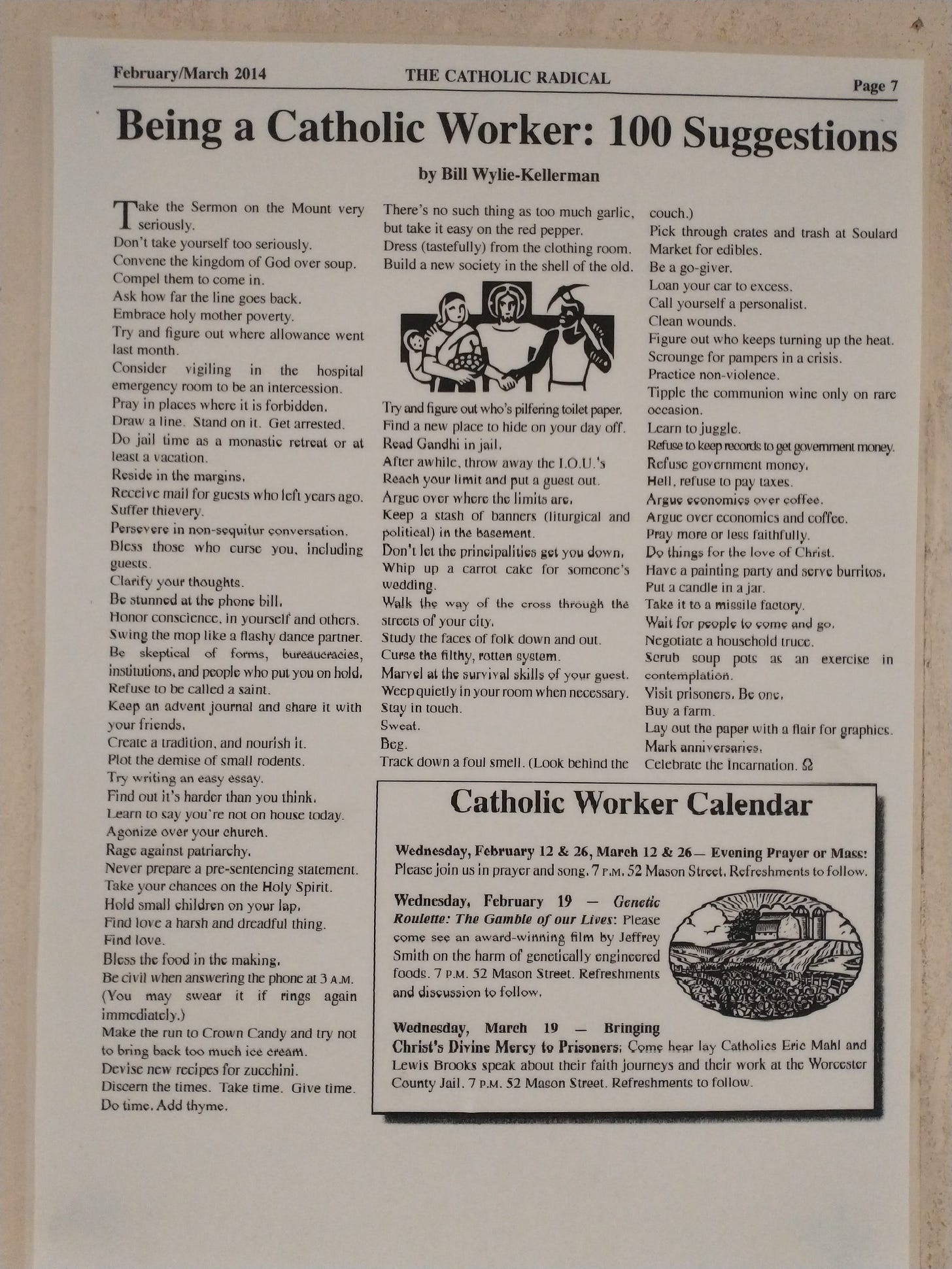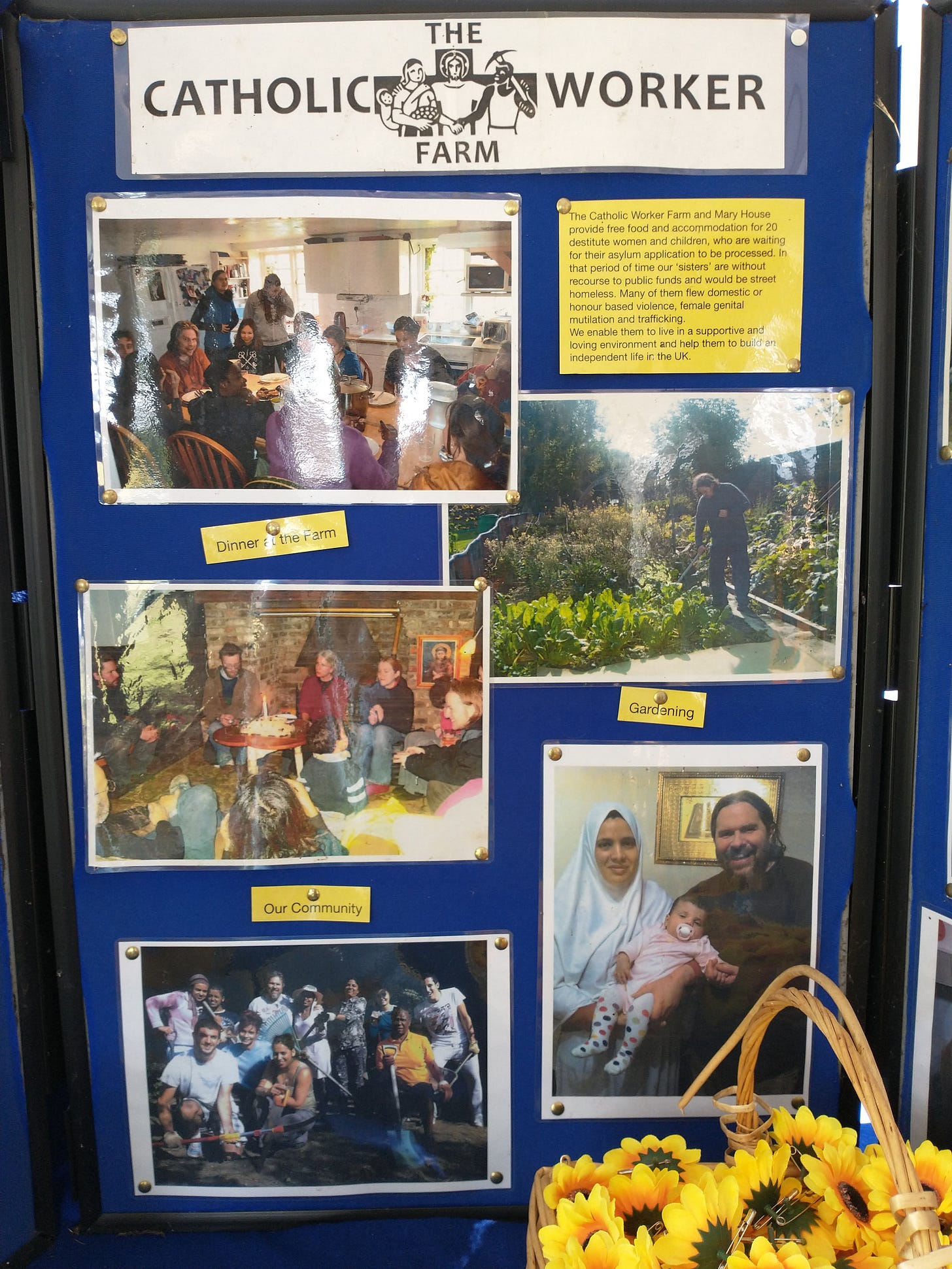During my brief stint in London, I had the opportunity to spend the afternoon of the 10th June with two Catholic Worker communities. When I mentioned this to someone they remarked “Are those the super radical ones who always end up in prison?” and when I reported this back to some Catholic Worker members they responded, “Pretty much!”! This poster I found in the toilet humorously conveys some of the vibe if you can read it (!):
Overview
The Catholic Worker Movement was founded in America during the great depression by a small group of individuals, including Dorothy Day and Peter Maurin. It started as a newspaper, called ‘The Catholic Worker”, which promoted Catholic social teaching and the duty to ‘live in accordance with the justice and charity of Jesus’1 . This then birthed the creation of houses of hospitality for the poor, and farming communes for the unemployed, as a striving towards the morals and ideals being written about. More on the history of the Catholic Worker Movement can be read about here.
The movement lives on in the form of a collection of autonomous communities (primarily in the US but with a small European presence too) who continue to produce “The Catholic Worker” newsletters and strive to fully live out Catholic social teaching, and care and fight for the oppressed and marginalised. It is both political and pacifist in its activities. I very much appreciate the movement’s aims and means as expressed on their website:
“The aim of the Catholic Worker movement is to live in accordance with the justice and charity of Jesus Christ. . . . This aim requires us to begin living in a different way. We recall the words of our founders, Dorothy Day who said, ‘God meant things to be much easier than we have made them,’ and Peter Maurin who wanted to build a society ‘where it is easier for people to be good.’”
London Catholic Worker
Each Catholic Worker is independent and has its own ways of doing things but in London, Harringay, this takes the form of a small group of Catholic Workers/community members/team living in community alongside ~10 guests who are destitute asylum seekers. Their life together comprises of:
Eating together every evening of the week (but if you’re out that’s fine :) ), with everyone being placed on the cooking rota;
A weekly meeting where community and house matters are discussed (e.g. rotas);
Occasional shared tasks, like sorting out donations;
Daily morning and evening prayer (optional and excluding Sundays);
For Catholic Worker members, contributing to the running of the community more fully, including renovating the building and assisting with asylum applications/processes.
Other interesting details:
The building the community lives in was donated by the church (and is a former church). They don’t have to pay rent but have to undertake its extensive and necessary maintenance work.
The community heavily relies on donations (financial, food, furniture, volunteered labour) for its survival, with some income received from producing “The London Catholic Worker” newsletter.
It’s quite a free-flowing community with various members having flowed in and out, and the mission of the community evolving over time (e.g. they used to be a night shelter and their political activity fluctuates).
Listen to this interview with Fr Martin who founded London Catholic Worker for more and deeper insights!
I also attended the Catholic Worker in Rickmansworth’s open day. I was only there briefly, and won’t go into detail about them, but they are a larger community of Catholic Workers and destitute asylum seekers and seem to have a more established volunteer programme for young adults to experience Catholic Worker community for ~ 1 year. Here’s their website for more, and a little noticeboard I photographed at their open day which reads:
“The Catholic Worker Farm and Mary House provide free food and accommodation for 20 destitute women and children who are waiting for their asylum application to be processed. In that period of time our ‘sisters’ are without recourse to public funds and would be street homeless. Many of them flew domestic or honour based violence, female genital mutilation and trafficking. We enable them to live in a supportive and loving environment and help them to build an independent life in the UK.”
Although my visit was fleeting, there is something undeniably inspiring about Catholic Worker’s conviction for social justice and commitment to extending full hospitality to those most in need of it.
Conversations
Whilst I was only with Catholic Worker for an afternoon, I had some fascinating conversations on community with its current members, some headlines of which I share below (also drawing on recent conversations I’ve had with other people too!):
Monastic Communities hosting Lay Community
Natalie, who has recently moved in, shared her prior experience of community, including a young adult community which the Augustinians had set up but which unfortunately no longer exists. The day before, someone had also shared with me that the Dominican community in North London (where the RadioMaria office is based) had recently sold part of their property.
It got me dreaming about the potential for monastic communities to use their excess property to provide accommodation (perhaps at just slightly below market rent?) to host lay community (whether for young adults or all generations), providing the monastic community income, whilst providing opportunities for lay community (from which numerous fruits emerge as I have experienced and repeatedly witnessed!)2.Church Property turned Community Housing
Building on the above, during my time at Chemin Neuf I had a conversation with a vicar about my hopes for transforming excess church property into community housing. He got equally as animated as myself (!), vocalising that his wife would love nothing better than to downsize, and to instead use their oversized vicarage to host a parish-linked community; the idea being that the rent paid helps financially sustain the parish, and the community members volunteer their time and the community houses’ space to the service of the parish.3 I long for the church to start thinking about property more creatively!!
Parish Communities
I talked at length with someone else about this vision and its potential for lay people to contribute more fully to the church (especially in the Catholic church where parishes can be more priest-centric). We also talked about the importance of such communities for people of all ages who, for whatever reason, don’t have families to live with. Society is set up for us to either live in nuclear families, or alone. Why should this have to be the case?Communities of Formation
Colette, a fellow community lover, also shared with me her experiences of the Jesuit Volunteer Corp - a young adult formation programme as run by the Jesuits. (It no longer exists in the UK but seems to still be going strong in the US (JVC USA website).) We discussed how formational and impactful these programmes are, how precious an investment they are into the Church, whilst also recognising that such programmes are incredibly costly and intensive to run, and therefore harder to sustain.Impact Monitoring
In the same conversation the phrase “What desires impact, kills impact” was also coined, in frustration that investments (financial, time and otherwise) are often assessed on relatively immediate measurable impact. In a world obsessed with tangible and short-term outcomes we risk impeding investment into immeasurable generational and multi-generational impact. And I like to leave room for God to operate and to trust in his workings (!!), and since when can the spiritual be measured!?
Intensity of Community Life
Thinking about the survival of community, for both its members and leaders, we talked about the intensity of commitment and how manageable this is for the community’s target audience e.g. the aforementioned Augustinian community seemed to essentially be a part-time commitment, but whilst also expecting members to pay rent (albeit much below market rate), making it challenging for young adults to navigate working (and outside- of-community) life.
As ever, these are but the fragments of much more extensive and developed conversations and ideas, but I hope to have at least provided some food for thought :)!
Next stop, 3 communities in the South West!!!
With love and blessings,
Lakshmi 😊🌻
https://catholicworker.org/
Obviously this would be an intensive undertaking for the monastic community, and probably only possible in a minority of cases, but I yearn for the church to start thinking about property more creatively!
There is much to be expanded upon here, and would likely require an extra member of staff to help pastorally coordinate the community amongst other things, but I do believe it is possible and scaleable!!






